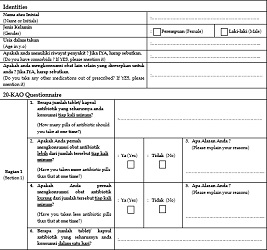Patient’s Compliance with Oral Antibiotics Treatments at Community Health Centers in Surabaya: A 20-KAO Questionnaire Development
Abstract
The irrational and incompliance use of antibiotics has been correlated to bacterial resistance. Several methods evaluated patients' compliance with oral antibiotics have been conducted. However, a standard questionnaire for evaluating oral antibiotics compliance in Indonesian has not been developed yet. This study was conducted to record the content validity of the developed questionnaire called 20-KAO to assess compliance with oral antibiotics. The validity content test was conducted through six experts review using the Item Content Validity Index (I-CVI) and Scale-Content Validity Index (S-CVI). The experts were also requested to provide recommendations for each item, whether revisions or deletion. After the review process, the number of questions remains unchanged. A total of 19 out of 20 items had an I-CVI of 1.00, and S-CVI was calculated at 0.98. Therefore, 20 items of the 20-KAO questionnaire have excellent content validity. However, future construct validity and reliability test to analyze the responses of targeted respondents and the questionnaire's consistency are needed.
Full text article
References
Bolarinwa, O.A. (2015). Principles and methods of validity and reliability testing of questionnaires used in social and health science researches. Nigerian Postgraduate Medical Journal, 22(4), 195-201. doi:10.4103/1117-1936.173959
Duong, M., Piroth, L., Grappin, M., Forte, F., Peytavin, G., Buisson, M., Chavanet, P., & Portier, H. (2001). Evaluation of the Patient Medication Adherence Questionnaire as a tool for self-reported adherence assessment in HIV-infected patients on antiretroviral regimens. HIV Clinical Trials, 2(2), 128-135. doi:10.1310/M3JR-G390-LXCM-F62G
Economou, V. & Gousia, P. (2015). Agriculture and food animals as a source of antimicrobial-resistant bacteria. Infection and Drug Resistance, 8, 49-61. doi:10.2147/IDR.S55778
Fair, R.J. & Tor, Y. (2014). Antibiotics and Bacterial Resistance in the 21st Century. Perspective in Medicinal Chemistry, 6, 25-64. doi:10.4137/PMC.S14459
Jin, J., Sklar, G.E., Oh, V.M.S., & Li, S.C. (2008). Factors affecting therapeutic compliance: A review from the patient’s perspective. Therapeutics and Clinical Risk Management, 4(1), 269-286. doi:10.2147/tcrm.s1458
Kandrotaite, K., Smigelskas, K., Janusauskiene, D., Jievaltas, M., Maciulaitis, R., & Briedis, V. (2013). Development of a short questionnaire to identify the risk of nonadherence to antibiotic treatment. Current Medical Research and Opinion, 29(11), 1555-1563. doi:10.1185/03007995.2013.835255
Kimberlin, C.L. & Winterstein, A.G. (2008). Validity and reliability of measurement instruments used in research. American Journal of Health-System Pharmacy, 65(23), 2276-2284. doi:10.2146/ajhp070364
Klein, E.Y., Boeckel, T.P.V., Martinez, E.M., Pant, S., Gandra, S., Levin, S.A., Goossens, H., & Laxminarayan, R. (2018). Global increase and geographic convergence in antibiotic consumption between 2000 and 2015. Proceedings of the National Academy of Sciences of the United States of America, 115(15), E3463-E3470. doi:10.1073/pnas.1717295115
Lam, W.Y. & Fresco, O. (2015). Medication Adherence Measures: An Overview. BioMed Research International, 2015, 217047. doi:10.1155/2015/217047
Llor, C., Hernández, S., Bayona, C., Moragas, A., Sierra, N., Hernández, M., & Miravitlles, M. (2013). A study of adherence to antibiotic treatment in ambulatory respiratory infections. International Journal of Infectious Diseases, 17(3), e168-172. doi:10.1016/j.ijid.2012.09.012
Martinez, J.L. (2017). Effect of antibiotics on bacterial populations: a multi-hierachical selection process. F1000Research, 6, 51. doi:10.12688/f1000research.9685.1
Moradi, M., Hamedi-Shahraki, S., Rezayee, M., & Verdi, M. (2013). Compliance with antimicrobial therapy: Evaluating the related factors. Journal of Pharmaceutical Care, 1(2), 60-64.
Morisky, D.E., Green, L.W., & Levine, D.M. (1986). Concurrent and predictive validity of a self-reported measure of medication adherence. Medical Care, 24(1), 67-74. doi:10.1097/00005650-198601000-00007
Muljabar, S.M. & Supadmi, W. (2014). Pengaruh Pemberian Informasi Obat terhadap Tingkat Kepatuhan Penggunaan Antibiotika pada Pasien ISPA di Puskesmas Kotagede I Yogyakarta. Pharmaciana: Jurnal Kefarmasian, 4(2), 143-149. doi:10.12928/pharmaciana.v4i2.1571
Polit, D.F. & Beck, C.T. (2006). The content validity index: are you sure you know what's being reported? Critique and recommendations. Research in Nursing and Health, 29(5), 489-497. doi:10.1002/nur.20147
Ponto, J. (2015). Understanding and Evaluating Survey Research. Journal of the Advanced Practitioner in Oncology, 6(2), 168-171.
Setia, M.S. (2017). Methodology Series Module 9: Designing Questionnaires and Clinical Record Forms – Part II. Indian Journal of Dermatology, 62(3), 258-261. doi:10.4103/ijd.IJD_200_17
Thompson, K., Kulkarni, J., & Sergejew, A.A. (2000). Reliability and validity of a new Medication Adherence Rating Scale (MARS) for the psychoses. Schizophrenia Research, 42(3), 241-247. doi:10.1016/s0920-9964(99)00130-9
Treibich, C. & Ventelou, B. (2017). Validation of a short-form questionnaire to check patients' adherence to antibiotic treatments in an outpatient setting. European Journal of Public Health, 27(6), 978-980. doi:10.1093/eurpub/ckx146
Williams, A.B., Amico, K.R., Bova, C., & Womack, J.A. (2013). A proposal for quality standards for measuring medication adherence in research. AIDS and Behavior, 17(1), 284-297. doi:10.1007/s10461-012-0172-7
Authors
Copyright (c) 2020 Ilil Maidatuz Zulfa, Widya Handayani

This work is licensed under a Creative Commons Attribution-ShareAlike 4.0 International License.
This work is licensed under a Creative Commons Attribution-ShareAlike 4.0 International License.
Authors continue to retain the copyright to the article if the article is published in the Borneo Journal of Pharmacy. They will also retain the publishing rights to the article without any restrictions.
Authors who publish in this journal agree to the following terms:
- Any article on the copyright is retained by the author(s).
- The author grants the journal the right of first publication with the work simultaneously licensed under a Creative Commons Attribution License that allows others to share work with an acknowledgment of the work authors and initial publications in this journal.
- Authors can enter into separate, additional contractual arrangements for the non-exclusive distribution of published articles (e.g., post-institutional repository) or publish them in a book, with acknowledgment of their initial publication in this journal.
- Authors are permitted and encouraged to post their work online (e.g., in institutional repositories or on their websites) prior to and during the submission process. This can lead to productive exchanges and earlier and greater citations of published work.
- The article and any associated published material are distributed under the Creative Commons Attribution-ShareAlike 4.0 International License.




